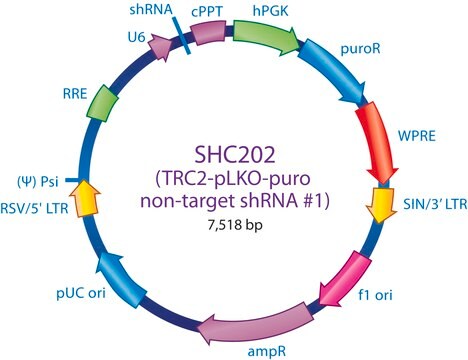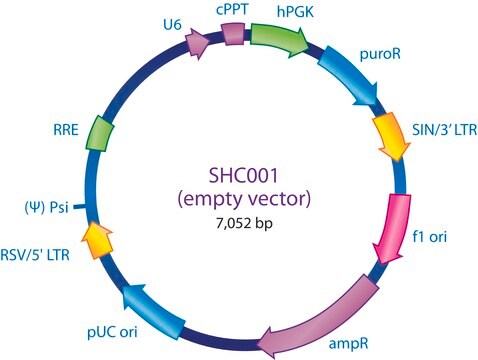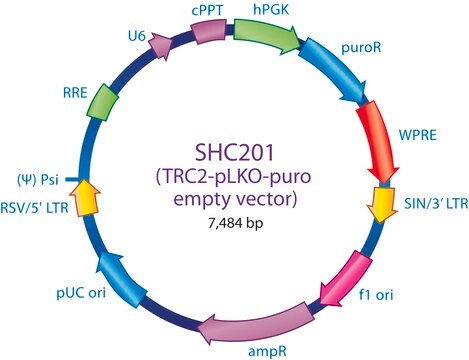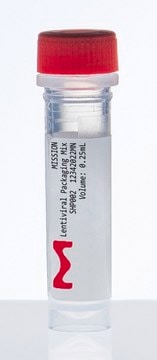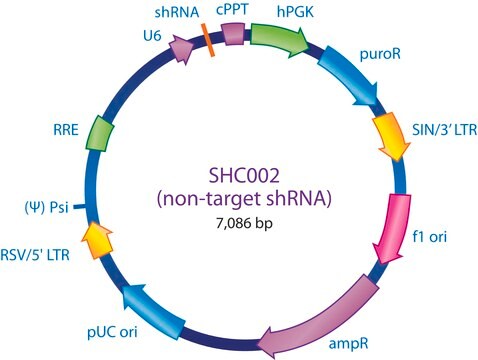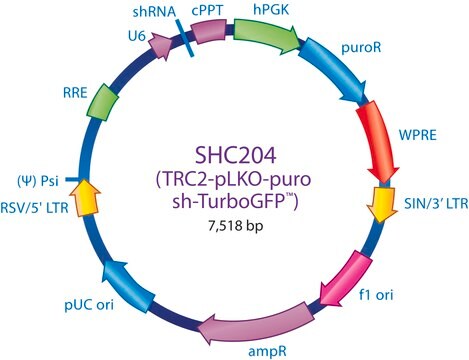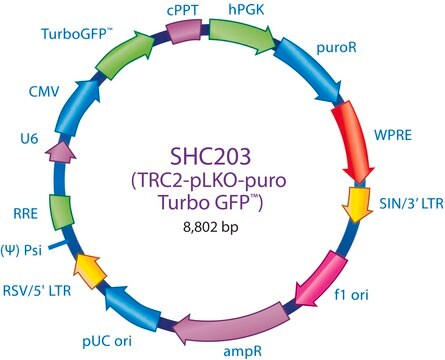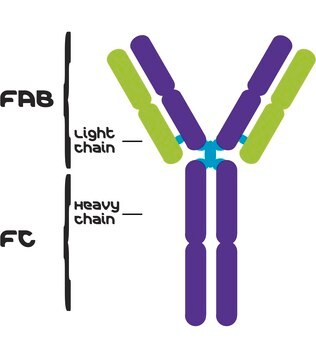추천 제품
Quality Level
제품 라인
MISSION®
농도
500 ng/μL in TE buffer; DNA (10μg of plasmid DNA)
배송 상태
dry ice
저장 온도
−20°C
유사한 제품을 찾으십니까? 방문 제품 비교 안내
일반 설명
The MISSION TRC2 Control Vector pLKO-puro is a lentivirus plasmid vector. This vector is in the TRC2 pLKO-puro plasmid backbone, which contains the WPRE. The vector does not contain an shRNA insert and is useful as a negative control in experiments using the TRC2 MISSION shRNA library clones. This allows one to examine the effect of transfection on gene expression and interpret the knockdown effect seen with shRNA clones.
Ampicillin and puromycin antibiotic resistance genes provide selection in bacterial or mammalian cells respectively. In addition, self-inactivating replication incompetent viral particles can be produced in packaging cells (HEK293T) by co-transfection with compatible packaging plasmids (SHP001). The TRC2 pLKO-puro Control Vector is provided as 10 μg of plasmid DNA in Tris-EDTA (TE) buffer at a concentration of 500 ng/μl.
Ampicillin and puromycin antibiotic resistance genes provide selection in bacterial or mammalian cells respectively. In addition, self-inactivating replication incompetent viral particles can be produced in packaging cells (HEK293T) by co-transfection with compatible packaging plasmids (SHP001). The TRC2 pLKO-puro Control Vector is provided as 10 μg of plasmid DNA in Tris-EDTA (TE) buffer at a concentration of 500 ng/μl.
애플리케이션
MISSION® TRC2 pLKO.5-puro Empty Vector Control Plasmid DNA has been used in:
- CRISPR library generation
- Viral constructs
- Plasmid construction
- CRISPR/Cas9-mediated knockouts.
Small interfering RNAs (siRNAs) expressed from short hairpin RNAs (shRNAs) are a powerful way to mediate gene specific RNA interference (RNAi) in mammalian cells. The MISSION product line is based on a viral vector-based RNAi library against annotated mouse and human genes. shRNAs that generate siRNAs intracellularly are expressed from amphotropic lentivirus viral particles, allowing screening in a wide range of mammalian cell lines. In these cell lines, MISSION shRNA clones permit rapid, cost efficient loss-of-function and genetic interaction screens.
To see more application data, protocols, vector maps visit sigma.com/shrna.
법적 정보
Use of this product is subject to one or more license agreements. For details, please see http://sigmaaldrich.com/missionlicense.
MISSION is a registered trademark of Merck KGaA, Darmstadt, Germany
Storage Class Code
12 - Non Combustible Liquids
WGK
WGK 3
Flash Point (°F)
Not applicable
Flash Point (°C)
Not applicable
가장 최신 버전 중 하나를 선택하세요:
이미 열람한 고객
Functional screening implicates miR-371-3p and peroxiredoxin 6 in reversible tolerance to cancer drugs.
Sahu N, et al.
Nature Communications, 7, 12351-12351 (2016)
A CRISPR screen identifies MAPK7 as a target for combination with MEK inhibition in KRAS mutant NSCLC.
Dompe N, et al.
PLoS ONE, 13(6), e0199264-e0199264 (2018)
Silencing of retrotransposons by SETDB1 inhibits the interferon response in acute myeloid leukemia.
Cuellar TL, et al.
The Journal of Cell Biology (2017)
Janet Lau et al.
Nature communications, 8, 14572-14572 (2017-02-22)
Expression of PD-L1, the ligand for T-cell inhibitory receptor PD-1, is one key immunosuppressive mechanism by which cancer avoids eradication by the immune system. Therapeutic use of blocking antibodies to PD-L1 or its receptor PD-1 has produced unparalleled, durable clinical
Dakota L Jones et al.
The Journal of cell biology, 220(5) (2021-02-25)
Matrix stiffness is a central regulator of fibroblast function. However, the transcriptional mechanisms linking matrix stiffness to changes in fibroblast phenotype are incompletely understood. Here, we evaluated the effect of matrix stiffness on genome-wide chromatin accessibility in freshly isolated lung
자사의 과학자팀은 생명 과학, 재료 과학, 화학 합성, 크로마토그래피, 분석 및 기타 많은 영역을 포함한 모든 과학 분야에 경험이 있습니다..
고객지원팀으로 연락바랍니다.